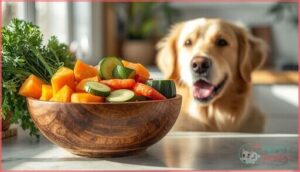This site is supported by our readers. We may earn a commission, at no cost to you, if you purchase through links.
Your dog’s pleading eyes follow every bite of your roasted butternut squash, and you wonder if sharing a piece would be a thoughtful treat or a trip to the emergency vet. The good news is that butternut squash can be a safe, nutritious addition to your dog’s diet when prepared correctly, offering fiber, vitamins, and a low-calorie snack option that many pups genuinely enjoy.
However, serving it safely requires knowing which parts to avoid, how to cook it properly, and what portion sizes work best for your dog’s specific needs. Understanding the preparation basics and potential risks helps you make informed decisions about whether this autumn favorite deserves a spot in your dog’s bowl.
Table Of Contents
- Key Takeaways
- Can Dogs Eat Butternut Squash?
- Nutritional Benefits of Butternut Squash for Dogs
- Safe Preparation and Serving Tips
- Potential Risks and Precautions
- Healthy Alternatives to Butternut Squash
- Frequently Asked Questions (FAQs)
- What is the best vegetable for dogs?
- Is butternut squash safe for my dog?
- How much butternut squash should I give my dog?
- What are the best ways to prepare butternut squash for my dog?
- What other types of squash are safe for my dog to eat?
- Can puppies eat butternut squash safely?
- Is raw butternut squash toxic to dogs?
- How often can dogs eat butternut squash?
- Does butternut squash help with dog diarrhea?
- Can butternut squash cause gas in dogs?
- Conclusion
Key Takeaways
- Butternut squash is safe for dogs when properly prepared—cooked until soft, served plain without seasonings, and with all seeds and skin completely removed to prevent choking hazards and digestive blockages.
- This vegetable offers genuine nutritional benefits including fiber for digestive health, vitamins A and C for immune support, and a low-calorie option for weight management when portioned correctly by dog size (1-2 tablespoons for small dogs, up to 1/4 cup for large breeds).
- While generally safe, you’ll need to watch for potential allergic reactions, digestive upset, or sensitivities when introducing butternut squash, and consult your veterinarian if your dog has chronic conditions like diabetes or pancreatitis before adding it to their diet.
- Healthy alternatives like pumpkin, sweet potatoes, carrots, and green beans provide similar nutritional advantages and can complement or replace butternut squash in your dog’s vegetable rotation when prepared correctly.
Can Dogs Eat Butternut Squash?
You might wonder whether butternut squash is safe for your furry friend, and the answer is a reassuring yes. Dogs can eat squash, including butternut varieties, when it’s properly prepared and served in moderation.
Just be sure to remove the seeds and skin first, and if you’re looking for other safe chew options, check out whether raw ham bones are a good choice for your dog.
This mild, sweet vegetable fits nicely into canine diet plans as a healthy treat option, offering a nutritious addition without upsetting your dog’s digestive system. The soft, cooked flesh is easy for dogs to chew and swallow, making it particularly digestive-friendly for pups of all ages.
Before you share this veggie with your companion, you’ll need to remove the seeds and peel to guarantee pet food safety. While squash allergy is rare, it’s wise to introduce small amounts initially and watch for any unusual reactions as you explore this wholesome treat.
For additional nutritional details, learn more about the health benefits of butternut squash.
Nutritional Benefits of Butternut Squash for Dogs
Butternut squash isn’t just safe for dogs—it’s packed with nutrients that can support their health in several meaningful ways.
From improving digestion to strengthening their immune system, this humble winter vegetable offers benefits that go beyond being a tasty treat.
Let’s look at the specific nutritional advantages butternut squash brings to your dog’s bowl.
Fiber for Digestive Health
Butternut squash delivers dietary fiber that aids your dog’s digestive health by keeping their gut bacteria balanced and promoting regular bowel movements.
Different fiber types work together to nourish the colon, improve digestion, and maintain overall gut health:
- Adds bulk to stool for smoother passage
- Feeds beneficial gut bacteria naturally
- Promotes consistent digestive rhythms
- Enhances nutrient absorption
- Promotes healthy colon function
For more insight into the value of dietary fiber, learn about its role in digestive health.
Essential Vitamins and Antioxidants
Beyond fiber, your dog gains essential vitamins and antioxidants from butternut squash that protect cells and boost immunity.
Like butternut squash, plums can safely supplement your dog’s diet with beneficial nutrients, though you should always remove the pit first.
Vitamin A from beta carotene promotes vision and skin health, while vitamin C strengthens immune defenses and collagen production.
Vitamin E benefits include protecting cell membranes from damage, and selenium support enhances antioxidant enzymes.
These flavonoid effects work together, delivering powerful antioxidant power for overall wellness.
Low-Calorie Snack for Weight Management
When calorie control becomes a priority for your pup, butternut squash offers a filling healthy snack without derailing your dog’s nutrition plan. A half-cup serving sits around 40 calories, so you can offer satisfying snack portions rich in high fiber while supporting healthy treats.
This nutrient balance helps with digestion in dogs, letting you provide volume and flavor without adding extra pounds to your dog diet.
Minerals Supporting Overall Wellness
Your dog’s body relies on a complex mineral balance to thrive, and butternut squash delivers several essential nutrients that promote daily wellness. Potassium helps regulate fluid balance and nerve signals, while iron carries oxygen through the bloodstream, both critical for your pup’s energy and vitality.
| Mineral | Function in Dog Nutrition |
|---|---|
| Potassium | Regulates fluid balance, aids nerve and muscle function |
| Iron | Carries oxygen in blood, maintains energy levels |
| Magnesium | Acts as cofactor in bone formation, regulates calcium intake |
| Phosphorus | Works with calcium intake for bone strength, aids energy production |
These nutrient-rich foods complement the fiber, vitamins, and antioxidants butternut squash already provides, creating a well-rounded addition to your dog’s diet when served appropriately.
Safe Preparation and Serving Tips
Before you share butternut squash with your dog, you’ll need to prepare it properly to guarantee it’s safe and easy to digest.
The way you cook, cut, and serve this vegetable can make all the difference in whether your dog enjoys it without any issues. Here’s what you need to know to get it right every time.
Removing Seeds and Peel
Proper seed extraction and peel removal are essential first steps in safe squash preparation for your pup. The tough skin and fibrous seeds can create digestive safety issues, from mild upset to serious blockage, so you’ll want to take a few minutes to prep the butternut squash correctly before cooking.
- Cut the squash in half lengthwise and scoop out all seeds with a sturdy spoon
- Rinse the cavity under running water to wash away remaining fibrous bits
- Use a sharp vegetable peeler or knife to remove the entire outer skin
- Trim the stem end first to create a stable, flat base for safer peeling
- Microwave for 1-2 minutes if the skin feels too hard to peel easily
These simple steps protect your dog’s digestion while preserving the nutrients that make butternut squash a worthwhile addition to canine nutrition.
Cooking Methods for Digestibility
Gentle cooking methods make all the difference when you’re preparing butternut squash for your dog’s sensitive digestive system. Steaming benefits include softening fibers while preserving nutrients, and light simmering breaks down resistant starches without mushiness.
These digestion techniques support canine gut health far better than roasting, which can reduce vitamin content. Aim for temperatures between 185 and 210 degrees Fahrenheit to improve nutrient preservation and digestibility.
Portion Sizes by Dog Size
Tailoring butternut squash portions to your dog’s size is essential for canine dietary needs and dog weight management. Small dogs under 20 pounds need only 1–2 tablespoons of cooked squash per serving, while medium dogs (20–50 pounds) can handle 2–4 tablespoons.
Large breeds over 50 pounds may enjoy up to 1/4 cup, supporting dog health and wellness without disrupting meal portioning or calorie intake in their size-based diets.
Avoiding Seasonings and Additives
In the case of butternut squash for your dog, keeping it simple protects their canine digestive system and aids healthy eating for dogs. Skip all seasonings and artificial additives to maintain a salt free diet that prevents digestive upset and promotes dog nutrition and health.
- Avoid table salt, butter, oil, or any spice blends in healthy cooking methods
- Never add sugar alternatives or sweeteners, especially toxic xylitol
- Choose plain squash without artificial colors or chemical preservatives
- Rely on natural preservatives by cooking fresh or frozen squash at home
- Remember that plain butternut squash tastes naturally sweet to dogs
Following this pet nutrition advice keeps treats safe and digestible.
Potential Risks and Precautions
While butternut squash offers plenty of nutritional perks for your dog, it’s not without a few safety concerns you’ll want to keep in mind.
Even healthy foods can cause problems if they’re not prepared correctly or if your dog has certain sensitivities. Let’s walk through the main risks and precautions to guarantee your pup enjoys this veggie safely.
Choking Hazards From Seeds and Skin
While butternut squash offers wonderful benefits, seeds and skin create real choking hazards you can’t ignore. Seeds larger than 5 millimeters can lodge in your dog’s throat, especially in small breeds, while fibrous skin may wrap around the airway during swallowing.
Chunks over 2 centimeters increase airway obstruction risk substantially. That’s why seed removal tips and proper preparation are essential for choking prevention and digestive blockage avoidance in your dog’s diet.
Allergic Reactions and Sensitivities
Beyond choking concerns, food allergies can develop even if your dog has eaten squash before without issue. Watch for allergic symptoms like itching on paws, face, or ears, along with hives or digestive upset.
Though rare, anaphylaxis risk exists with severe reactions causing vomiting or collapse. If skin irritation or swelling appears, stop feeding butternut squash immediately and contact your veterinarian for sensitivity testing and guidance on your dog’s dietary needs.
Monitoring for Digestive Upset
Even with proper preparation, digestive health can shift when you introduce new foods. Track your dog’s stool monitoring closely for changes in consistency, frequency, or color over the first few days.
Vomiting signs, persistent flatulence, or abdominal pain warrant feeding adjustments—reduce portions or pause butternut squash entirely. If symptoms continue beyond 48 hours despite dietary fiber modifications, contact your vet to restore gastrointestinal health and nutritional balance.
Consulting Your Veterinarian
When digestive symptoms persist or you’re managing chronic conditions like diabetes or pancreatitis, veterinary guidance becomes your best resource for pet nutrition plans and canine diet advice.
Your vet will review medications, assess food tolerances, and create customized dog health checks suited to your pet’s age and activity level—ensuring butternut squash complements, rather than compromises, your dog’s overall veterinary care and wellness goals.
Healthy Alternatives to Butternut Squash
If your dog doesn’t take to butternut squash or you’re looking to add more variety to their veggie rotation, you’re in luck.
There are several equally nutritious alternatives that offer similar health benefits, and many dogs find them just as tasty. Let’s look at a few safe, vet-approved options that can complement or replace butternut squash in your dog’s diet.
Pumpkin as a Dog-Friendly Option
If you’re looking for a reliable alternative, pumpkin stands out as one of the most dog-friendly foods for canine digestion. This fiber-rich option promotes pet wellness by promoting regular bowel movements and maintaining dog hydration through its natural moisture content.
You can serve plain canned pumpkin or fresh cooked varieties as a nutritious addition to your dog’s diet, making it an excellent companion to butternut squash and other dog-safe vegetables.
Sweet Potatoes for Added Nutrition
Sweet potatoes bring nutrient balance and dietary variety to your dog’s menu, offering beta carotene for eye health plus minerals like potassium for muscle function.
You can serve small portions of plain, cooked sweet potato as healthy treats that support canine wellness without extra calories. Their natural fiber aids digestion much like butternut squash, making them an excellent addition to your dog diet and nutrition plan.
Comparing Other Safe Vegetables
Beyond butternut squash, you’ll find plenty of dog-friendly foods that deliver vegetable nutrition and support your canine diet plans with healthy snacking options.
- Carrots provide beta carotene for eye health, served raw or cooked in bite-sized pieces as dog-safe vegetables.
- Green beans offer low-calorie, high-fiber crunch when plain.
- Zucchini aids hydration and digestion when steamed.
- Cucumbers make cooling, stomach-gentle snacks in thin slices, broadening your pet food options with vegetable benefits.
Frequently Asked Questions (FAQs)
What is the best vegetable for dogs?
There’s no one-size-fits-all answer in Pet Wellness, but pumpkin, sweet potatoes, green beans, and carrots top most canine diet experts’ lists for Veggie Nutrition, offering fiber, vitamins, and minerals dogs need.
Is butternut squash safe for my dog?
Yes, butternut squash is safe for your dog when you prepare it correctly—cooked, plain, and free of seeds and skin—making it a healthy treat option that promotes canine digestion and overall pet food safety.
How much butternut squash should I give my dog?
Portion size depends directly on your dog’s weight and dietary needs. Small dogs under 20 pounds need just 1 teaspoon to 1 tablespoon daily, while large breeds can enjoy 2–3 tablespoons safely.
What are the best ways to prepare butternut squash for my dog?
Steam or boil peeled squash until soft, then mash or dice it into bite-sized pieces.
Let it cool to room temperature before mixing into your dog’s regular food or serving as a plain, unseasoned treat.
What other types of squash are safe for my dog to eat?
Your pup can safely enjoy several squash varieties beyond butternut.
Zucchini, pumpkin, acorn squash, spaghetti squash, and delicata squash all offer valuable dog nutrition when cooked plain, supporting canine diet wellness through fiber and essential vitamins.
Can puppies eat butternut squash safely?
When fully cooked and served plain without skin or seeds, butternut squash is safe for puppies in small, bite-sized pieces.
Start with tiny amounts to monitor digestive health and potential squash allergy signs.
Is raw butternut squash toxic to dogs?
There’s a myth that raw butternut squash is toxic to dogs, but the flesh itself isn’t poisonous.
However, its tough texture can cause digestive upset, gas, or choking, making cooked squash far safer.
How often can dogs eat butternut squash?
You can offer butternut squash daily in small amounts, following the 10 percent treat rule for your dog’s diet.
Portion sizes depend on weight, with tiny breeds receiving teaspoons and larger dogs getting tablespoons.
Does butternut squash help with dog diarrhea?
Yes, butternut squash can help with dog diarrhea thanks to its fiber benefits supporting gut health and stool regulation.
The soluble fiber absorbs excess water, promoting digestion and canine nutrition during mild episodes.
Can butternut squash cause gas in dogs?
Butternut squash can cause gas in dogs if you introduce it too quickly or serve oversized portions, since the high fiber content slows digestion and triggers temporary bloating in sensitive pups.
Conclusion
Think of butternut squash as a nutritional building block in your dog’s diet—one piece of a complete foundation, not the entire structure. When you prepare it thoughtfully, removing seeds and skin while keeping portions appropriate for your dog’s size, you’re offering genuine health benefits without unnecessary risks.
Can dogs eat butternut squash? Absolutely, but your preparation method and portion control determine whether this orange vegetable becomes a safe, valuable treat or a potential problem.














